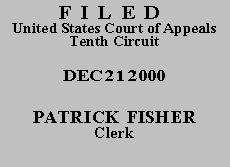

| JOHN HARLAN,
Plaintiff-Appellant, v. KENNETH S. APFEL, Commissioner, Social Security Administration, Defendant-Appellee. |
|
Claimant John M. Harlan appeals the district court's affirmance of the decision by the Commissioner of Social Security denying his applications for disability insurance benefits and supplemental security income. Because the Commissioner's decision is supported by substantial evidence and no legal errors occurred, we affirm.
Claimant filed for benefits alleging he was unable to work after December 15, 1993, due to post traumatic stress disorder (PTSD), stomach problems, and back pain. After a hearing, the administrative law judge (ALJ) found that although claimant could not return to his former work, he retained the ability to perform a significant number of jobs in the economy and therefore was not disabled. The Appeals Council denied review, making the ALJ's determination the final decision of the Commissioner. The district court affirmed, and this appeal followed.
We review the Commissioner's decision only to determine whether it is supported by substantial evidence and whether legal errors occurred. Qualls v. Apfel, 206 F.3d 1368, 1371 (10th Cir. 2000). Substantial evidence is that which a reasonable mind might accept as adequate to support a conclusion. Richardson v. Perales, 402 U.S. 389, 401 (1971). We may not reweigh the evidence or substitute our judgment for that of the agency. Casias v. Secretary of Health & Human Servs., 933 F.2d 799, 800 (10th Cir. 1991).
Claimant argues that the ALJ ignored Veterans Administration evidence regarding his PTSD and failed to develop the record about his inability to control his anger at work. After reviewing the record, we conclude the ALJ fully considered the evidence of claimant's PTSD and adequately developed the record pertaining to claimant's ability to maintain his employment.
The ALJ cited extensively to claimant's records from the Veterans Administration and explained his reason for disregarding its 100% disability rating, noting that the Veterans Administration applied different standards and relied on claimant's unemployment in making its disability determination. See Appellant's App. II at 24-25. The ALJ also accepted Veterans Administration evidence that claimant was moderately impaired in his ability to relate to others, but noted that claimant was able to go bowling weekly, that he had held various jobs for extended periods of time, and that he had been rehired by the same companies on numerous occasions. So long as the record demonstrates that the ALJ considered the evidence, he is "not required to discuss every piece of evidence." Clifton v. Chater, 79 F.3d 1007, 1009-10 (10th Cir. 1996).
In addition, the ALJ was not required to further pursue the conditions under which claimant bowled, but was entitled to draw the reasonable inference that there were other people in the bowling alley at these times. We note that claimant participated in several other activities that required the ability to relate to others, including hunting with a friend three days a month, occasionally visiting friends, attending Alcoholics Anonymous meetings twice a week, and acting as treasurer of the Alcoholics Anonymous Welcome group. The ALJ also was not required to contact claimant's past employers, but was entitled to rely on the lengths of time claimant worked for his employers and the fact that seven of them rehired claimant in determining that he could control his anger sufficiently to retain a job. The judgment of the United States District Court for the Eastern District of Oklahoma is AFFIRMED.
Entered for the Court
Circuit Judge
*. This order and judgment is not binding precedent, except under the doctrines of law of the case, res judicata, and collateral estoppel. The court generally disfavors the citation of orders and judgments; nevertheless, an order and judgment may be cited under the terms and conditions of 10th Cir. R. 36.3.